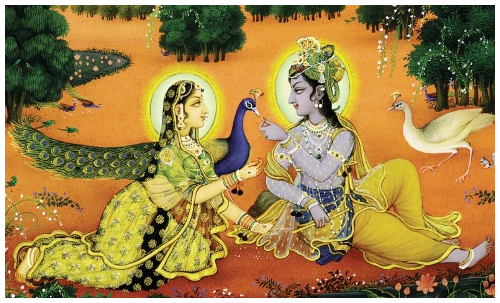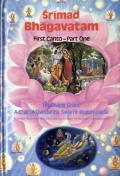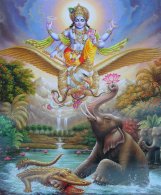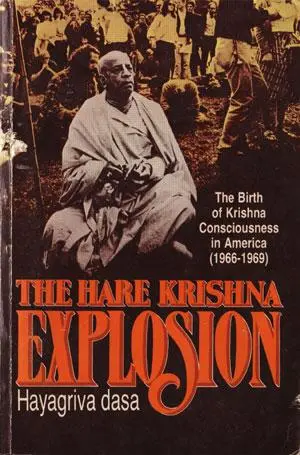Here is a another word for your vaisnava vocabulary; Kṛṣṇa-kathā. The following is from the Introduction to the Krsna Book and how narrations describing the transcendental activities of the Lord are relished by liberated souls. But whether one is liberated or is trying to be liberated, or is even grossly materialistic, the pastimes of Lord Kṛṣṇa are worth studying. The more people know about Kṛṣṇa, the more they will be perfectly benefited in this human form of life.
…Kṛṣṇa-kathā means narrations about Kṛṣṇa. There are two kṛṣṇa-kathās: narrations spoken by Kṛṣṇa and narrations spoken about Kṛṣṇa. Bhagavad-gītā is the narration or the philosophy or the science of God, spoken by Kṛṣṇa Himself. Śrīmad-Bhāgavatam is the narration about the activities and transcendental pastimes of Kṛṣṇa. Both are Kṛṣṇa-kathā. It is the order of Lord Caitanya that Kṛṣṇa-kathā should be spread all over the world, because if the conditioned souls, suffering under the pangs of material existence, take to Kṛṣṇa-kathā, then their path of liberation will be open and clear. The purpose of presenting this book is primarily to induce people to understand Kṛṣṇa or Kṛṣṇa-kathā, because thereby they can become freed from material bondage. (from introduction to “Krsna, The Supreme Personality of Godhead”)
The pastimes of the Lord are generally heard and relished by liberated souls. Those who are conditioned souls are interested in reading fictional stories of the material activities of some common man. Narrations describing the transcendental activities of the Lord are found in Śrīmad-Bhāgavatam and other Purāṇas. But, the conditioned souls still prefer to study ordinary narrations. They are not so interested in studying the narrations of the pastimes of the Lord, Kṛṣṇa. And yet, the descriptions of the pastimes of Lord Kṛṣṇa are so attractive that they are relishable for all classes of men. There are three classes of men in this world. One class consists of liberated souls, another consists of those who are trying to be liberated, and the third consists of materialistic men. Whether one is liberated or is trying to be liberated, or is even grossly materialistic, the pastimes of Lord Kṛṣṇa are worth studying.
Liberated souls have no interest in materialistic activities. The impersonalist theory that after liberation one becomes inactive and needs hear nothing does not prove that a liberated person is actually inactive. A living soul cannot be inactive. He is either active in the conditioned state or in the liberated state. A diseased person, for example, is also active, but his activities are all painful. The same person, when freed from the diseased condition, is still active, but in the healthy condition the activities are full of pleasure. Similarly, the impersonalists manage to get freed from the diseased conditional activities, but they have no information of activities in the healthy condition. Those who are actually liberated and in full knowledge take to hearing the activities of Kṛṣṇa; such engagement is pure spiritual activity.
It is essential for persons who are actually liberated to hear about the pastimes of Kṛṣṇa. That is the supreme relishable subject matter for one in the liberated state. Also, if persons who are trying to be liberated hear such narrations as Bhagavad-gītā and Śrīmad-Bhāgavatam, then their path of liberation becomes very clear. Bhagavad-gītā is the preliminary study of Śrīmad-Bhāgavatam. By studying the Gītā, one becomes fully conscious of the position of Lord Kṛṣṇa; and when he is situated at the lotus feet of Kṛṣṇa, he understands the narrations of Kṛṣṇa as described in the Śrīmad-Bhāgavatam. Lord Caitanya has therefore advised His followers that their business is to propagate Kṛṣṇa-kathā.
Kṛṣṇa-kathā means narrations about Kṛṣṇa. There are two kṛṣṇa-kathās: narrations spoken by Kṛṣṇa and narrations spoken about Kṛṣṇa. Bhagavad-gītā is the narration or the philosophy or the science of God, spoken by Kṛṣṇa Himself. Śrīmad-Bhāgavatam is the narration about the activities and transcendental pastimes of Kṛṣṇa. Both are Kṛṣṇa-kathā. It is the order of Lord Caitanya that Kṛṣṇa-kathā should be spread all over the world, because if the conditioned souls, suffering under the pangs of material existence, take to Kṛṣṇa-kathā, then their path of liberation will be open and clear. The purpose of presenting this book is primarily to induce people to understand Kṛṣṇa or Kṛṣṇa-kathā, because thereby they can become freed from material bondage.
This Kṛṣṇa-kathā will also be very much appealing to the most materialistic persons because Kṛṣṇa’s pastimes with the gopīs (cowherd girls) are exactly like the loving affairs between young girls and boys within this material world. Actually, the sex feeling found in human society is not unnatural because this same sex feeling is there in the original Personality of Godhead. The pleasure potency is called Śrīmatī Rādhārāṇī. The attraction of loving affairs on the basis of sex feeling is the original feature of the Supreme Personality of Godhead, and we, the conditioned souls, being part and parcel of the Supreme, have such feelings also, but they are experienced within a perverted, minute condition. Therefore, when those who are after sex life in this material world hear about Kṛṣṇa’s pastimes with the gopīs, they will relish transcendental pleasure, although it appears to be materialistic. The advantage will be that they will gradually be elevated to the spiritual platform. In the Bhāgavatam it is stated that if one hears the pastimes of Lord Kṛṣṇa with the gopīs, from authorities with submission, then he will be promoted to the platform of transcendental loving service to the Lord, and the material disease of lust within his heart will be completely vanquished. In other words, it will counteract the material sex life.
Kṛṣṇa will be appealing to the liberated souls and to persons who are trying to be liberated, as well as to the gross, conditioned materialist. According to the statement of Mahārāja Parīkṣit, who heard about Kṛṣṇa from Śukadeva Gosvāmī, Kṛṣṇa-kathā is equally applicable to every human being, in whatever condition of life he is in. Everyone will appreciate it to the highest magnitude. But Mahārāja Parīkṣit also warned that persons who are simply engaged in killing animals and in killing themselves may not be very much attracted to Kṛṣṇa-kathā. In other words, ordinary persons who are following the regulative moral principles of scriptures, no matter in what condition they are found, will certainly be attracted, but not persons who are killing themselves. The exact word used in the Śrīmad-Bhāgavatam is paśughna, which means killing animals or killing oneself. Persons who are not self-realized and who are not interested in spiritual realization are killing themselves; they are committing suicide. Because this human form of life is especially meant for self-realization, by neglecting this important part of his activities, one simply wastes his time like the animals. So he is paśughna. The other meaning of the word refers to those who are actually killing animals. This means persons who are animal eaters (even dog eaters), and they are all engaged in killing animals in so many ways, such as hunting, opening slaughterhouses, etc. Such persons cannot be interested in Kṛṣṇa-kathā.















1 Comment (+add yours?)